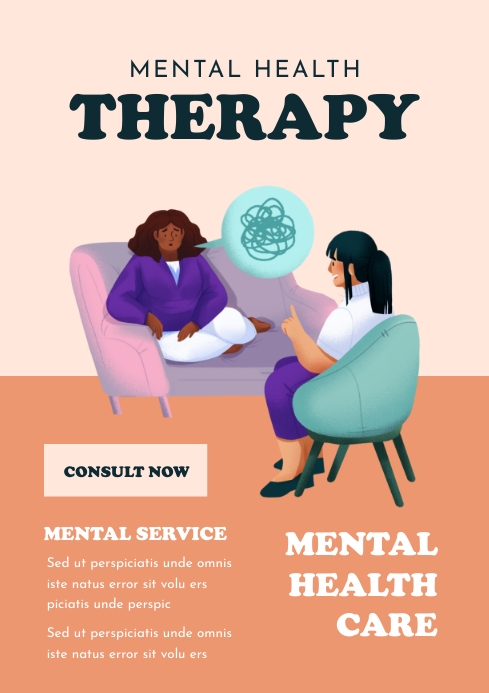Unlocking the Secrets of Mental Wellness: A Review of Therapy and Treatment Alternatives
Mental health and wellness is a facility and vital facet of overall health. Countless counseling and therapy choices exist to resolve various emotional difficulties. Each approach uses distinct advantages and methods tailored to specific requirements. Recognizing these alternatives is vital for any individual looking for to enhance their mental health. Couples Therapy. What elements should one think about when discovering these avenues? The response may expose a path to a healthier mood
Understanding Mental Wellness and Its Significance
Psychological wellness includes the emotional, psychological, and social health of individuals, considerably influencing just how they assume, really feel, and act. Its value can not be overstated, as it influences every aspect of life, including relationships, job performance, and overall lifestyle. Individuals with great mental health tend to manage stress more effectively, keep healthier partnerships, and make notified decisions. Alternatively, bad mental health and wellness can bring about emotional distress, impaired performance, and different mental illness, which might call for specialist intervention. Understanding mental health is crucial for identifying the signs of distress and the need for assistance. Recognition likewise promotes empathy and decreases preconception, encouraging individuals to look for help when needed. By prioritizing mental wellness, communities can foster atmospheres that sustain emotional well-being, eventually causing much healthier, much more resilient individuals. This foundation serves as a crucial action towards efficient mental health and wellness counseling and therapy alternatives.
Types of Therapy Approaches
Counseling methods differ extensively, each tailored to satisfy the special requirements of people seeking assistance. Among the most usual kinds are cognitive-behavioral treatment (CBT), which focuses on recognizing and altering unfavorable thought patterns, and person-centered treatment, which emphasizes empathy and approval. Psychodynamic therapy discovers previous experiences and unconscious procedures to understand present actions, while solution-focused quick therapy intends to determine services instead of investigate problems.Additionally, family members treatment addresses relational characteristics and interaction within families, cultivating much healthier communications. Team therapy provides a communal space for individuals to share experiences and sustain one another. Various other strategies consist of existential treatment, which urges people to locate definition and function, and art or music treatment, which uses innovative expression as a restorative device. Each technique provides unique methods and ideologies, allowing customers to locate the most suitable approach for their individual growth and healing trips.
Discovering Various Therapy Methods
In the domain name of mental health and wellness therapy, various treatment methods supply unique techniques to therapy. Cognitive Behavior Therapy emphasizes the link in between ideas and habits, while Psychodynamic Therapy checks out subconscious influences on psychological health. In Addition, Mindfulness-Based Methods advertise present-moment understanding as a means to boost emotional policy and total mental wellness.
Cognitive Behavioral Treatment
Cognitive Behavior Modification (CBT) stands apart as one of one of the most commonly exercised and researched methods in psychological health therapy. This approach concentrates on the interconnection between sensations, actions, and ideas, emphasizing that modifying unfavorable idea patterns can result in improved emotional well-being and behavior changes. CBT is structured, normally including a limited number of sessions, and intends to equip individuals with useful abilities to manage their signs. It works for a variety of conditions, including stress and anxiety problems, clinical depression, and trauma. By using methods such as cognitive restructuring and direct exposure treatment, CBT promotes durability and equips customers to challenge obstacles head-on, making it a valuable choice in the landscape of mental health and wellness therapies.
Psychodynamic Therapy Approaches
Psychodynamic therapy techniques supply a deep exploration of the unconscious mind and its impact on actions and psychological wellness. Rooted in Freudian concept, these techniques emphasize the relevance of early childhood years experiences and subconscious disputes. Via methods such as complimentary association, dream evaluation, and transference, people get understanding right into their ideas and sensations, fostering self-awareness and understanding. This therapeutic modality urges customers to reveal repressed feelings and unresolved problems, which can be essential in attending to present emotional challenges. By analyzing the interplay in between existing habits and previous experiences, psychodynamic therapy aims to promote emotional recovery and individual growth. Ultimately, it provides a structure for people to check out complex internal characteristics that affect their mental health.

Mindfulness-Based Strategies
While conventional therapies frequently focus on past experiences, mindfulness-based methods prioritize present-moment awareness as a pathway to emotional well-being. These methods, including mindfulness-based cognitive therapy (MBCT) and mindfulness-based stress and anxiety decrease (MBSR), motivate people to engage fully with their ideas and feelings without judgment. Specialists discover to observe their psychological states, promoting a better understanding of psychological triggers and reactions. This method not only relieves signs and symptoms of anxiousness and depression yet additionally improves total psychological strength. By incorporating mindfulness exercises, such as reflection and deep breathing, customers grow a feeling of peace and clearness. Inevitably, mindfulness-based strategies equip individuals to navigate life's obstacles with increased awareness and acceptance, advertising a much healthier partnership with their ideas and emotions.
The Role of a Specialist or Therapist
A skilled therapist or counselor plays an essential duty in supporting people with their psychological wellness trips. They give a risk-free, non-judgmental room where customers can reveal their thoughts and sensations openly. Marriage Counselling. By using numerous therapeutic strategies tailored per person's demands, specialists assist customers check out underlying issues that might add to their psychological health and wellness challenges.Therapists provide support and tools to deal with anxiety, anxiety, depression, and other emotional problems. Their training outfits them to identify patterns in actions and believed processes, assisting in understandings that result in individual growth. They likewise cultivate a strong healing alliance, which is crucial for successful outcomes.Moreover, therapists remain dedicated to discretion and honest requirements, making sure a wikipedia reference trusting setting. Ultimately, the function of a specialist or therapist is to equip people, urging them to create resilience and much healthier coping strategies while steering through life's complexities
Exactly how to Pick the Right Counseling or Treatment Option
Selecting the appropriate counseling or treatment option starts with examining private requirements. It is important to recognize personal challenges and objectives before checking out different therapy designs. This fundamental step can significantly influence the effectiveness of the chosen method.
Assess Your Requirements

Just how can people efficiently assess their mental health requires when assessing therapy or treatment alternatives? Initially, they must review their mood and determine particular problems, such his explanation as stress and anxiety, relationship, or anxiety difficulties. Journaling can be a helpful device for tracking ideas and feelings gradually. Additionally, individuals might gain from looking for responses from relied on friends or household members regarding perceived modifications in behavior or mood. It is also practical to review individual goals for treatment, such as boosting coping abilities or getting insight into personal patterns. Looking into numerous counseling methods and their viability for certain demands can help in making an educated selection. Inevitably, self-awareness plays a critical duty in picking the best path for psychological health assistance.
Check Out Treatment Designs
While going across the diverse landscape of treatment choices, individuals must consider various designs of counseling to find the best suitable for their one-of-a-kind requirements. Cognitive Behavior Modification (CBT) concentrates on altering adverse thought patterns, while Psychodynamic Treatment checks out subconscious procedures and previous experiences. Humanistic techniques highlight personal growth and self-actualization, cultivating a supportive environment. Additionally, mindfulness-based treatments grow present-moment recognition, aiding psychological law. For those seeking structure, Solution-Focused Brief Therapy targets details objectives and services. Team therapy supplies a common setup for common experiences and assistance. Ultimately, people should assess their preferences, convenience levels, and specific difficulties, ensuring they pick a therapeutic style that reverberates with their personal journey towards mental health.
Getting Over Obstacles to Seeking Aid

The Advantages of Therapy and Treatment for Mental Health
Seeking help for mental health obstacles can lead to considerable enhancements in general health. Counseling and treatment give people with a secure area to explore their thoughts and feelings, cultivating self-awareness and personal development. These professional services gear up clients with coping methods and problem-solving abilities customized anonymous to their distinct situations.Moreover, treatment can reduce signs and symptoms of stress and anxiety, anxiety, and other mental health and wellness problems, enhancing psychological durability. Routine sessions advertise liability and urge individuals to establish and accomplish personal objectives. Via various restorative modalities, such as cognitive-behavioral therapy or mindfulness practices, customers discover to reframe unfavorable thoughts and create much healthier behaviors.Additionally, the healing connection itself can be a source of assistance, aiding to combat seclusion and solitude. Generally, taking part in therapy and treatment is a proactive action toward achieving psychological wellness, making it possible for people to lead more meeting lives.
Regularly Asked Inquiries
The Length Of Time Does Counseling or Therapy Commonly Last?
The duration of counseling or therapy varies considerably, commonly lasting from a couple of sessions to several months or years. Elements affecting this consist of the person's certain requirements, the sort of therapy, and therapeutic objectives.
What Should I Anticipate Throughout My Initial Session?
During the first session, people can expect an intro, discussion of issues, and the specialist's technique. They may finish assessments and develop objectives, cultivating a safe setting for open communication and structure rapport.

Are There Any Kind Of Risks Connected With Treatment?
Therapy can include dangers, such as psychological discomfort, susceptability, or confronting uncomfortable memories. While these challenges might arise, they can also cause individual development and recovery, making the healing process complicated yet possibly fulfilling.
How Can I Inform if My Therapist Is a Great Fit?
Establishing if a specialist is a great fit involves reviewing comfort, interaction design, and therapeutic approach. Favorable rapport and development in the direction of objectives are indicators of an appropriate suit, important for effective mental health support.
Will My Insurance Cover Therapy or Treatment Procedure?
Identifying insurance policy protection for therapy or therapy sessions commonly needs getting in touch with the insurance provider directly. Plans vary substantially, so people need to confirm advantages, co-pays, and any necessary pre-approvals before going after therapy solutions. Among the most common kinds are cognitive-behavioral therapy (CBT), which focuses on identifying and altering adverse thought patterns, and person-centered therapy, which highlights compassion and approval. Psychodynamic therapy discovers previous experiences and unconscious processes to understand current behavior, while solution-focused brief therapy aims to determine solutions rather than check out problems.Additionally, family treatment addresses relational characteristics and interaction within families, cultivating healthier interactions. Various other approaches consist of existential treatment, which urges people to find significance and purpose, and art or songs treatment, which utilizes innovative expression as a healing device. Cognitive Behavior Therapy emphasizes the connection in between actions and ideas, while Psychodynamic Therapy discovers subconscious influences on emotional health. Cognitive Behavior Therapy (CBT) focuses on transforming unfavorable idea patterns, while Psychodynamic Therapy checks out subconscious procedures and past experiences.